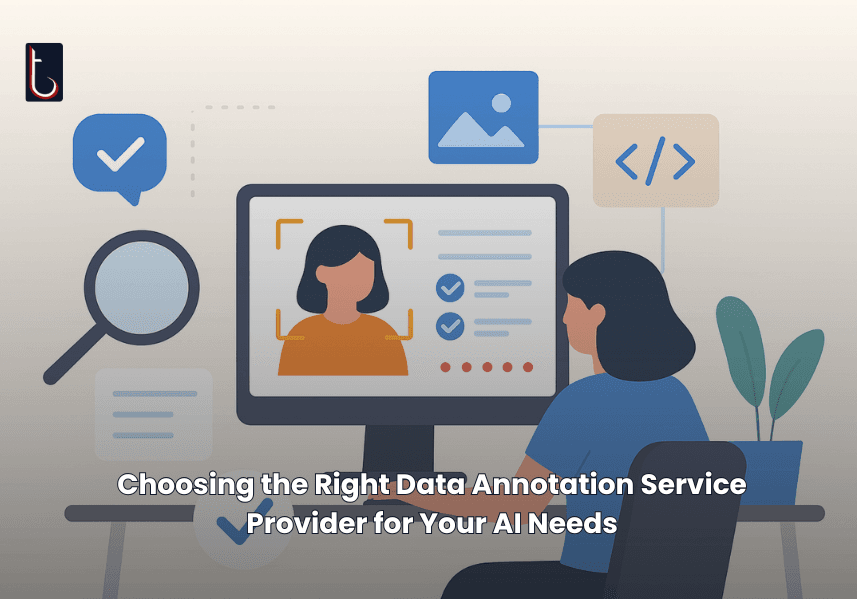Table of Contents
Choosing the Right Data Annotation Service Provider for Your AI Needs

Data is the foundation of any AI model. Poor-quality labels or inconsistent annotation standards can lead to models that perform badly, make wrong predictions, or are not trusted in production. As organizations build or scale AI projects, selecting the right data annotation service provider is critical.
In this blog you’ll learn:
- What is data annotation?
- Why data annotation matters for AI model performance?
- Key qualities you should look for in a data annotation service provider
- A comparison of popular annotation service providers
- Common mistakes to avoid
- How to get started selecting a data annotation service provider?
What is Data Annotation?
Data annotation is the process of labeling raw data; such as images, videos, text, or audio so that AI and machine learning models can understand and learn from it. It provides the “ground truth” that helps algorithms identify patterns and make accurate predictions.
In simple terms, annotated data teaches models how to recognize what they’re looking at.
For example:
- Labeling thousands of car images helps a computer vision model detect vehicles in real time.
- Tagging intent and sentiment in text allows natural language models to understand human emotions.
- Transcribing and marking speech data enables voice assistants to interpret spoken commands accurately.
Data annotation can be manual, automated, or hybrid (Human-in-the-Loop). While automated tools speed up labeling, human reviewers are still crucial for quality control and context understanding, especially in complex or domain-specific datasets.
A reliable data annotation service provider ensures that this process is accurate, scalable, and secure so your AI models can train on high-quality, bias-free data
Why Data Annotation Matters for AI Model Success
- Accuracy of model outputs depends heavily on the correctness and consistency of annotated data. Garbage in, garbage out.
- When fine-tuning large language models (LLMs) or training enterprise-level models, small labeling errors scale badly.
- Annotation impacts model fairness and bias. If labels are inconsistent or biased, the model learns those biases.
- Annotation speed and scale affect time to market. Faster turnaround without compromising quality can give a competitive edge.
- Domains like healthcare, autonomous driving, finance have stringent regulatory, safety or ethical requirements. Annotation providers must meet those standards.
Key Qualities of a Reliable Data Annotation Service Provider
When evaluating providers, these features are important:
- Data Quality and Accuracy Standards
- Clear annotation guidelines and training for annotators
- Multi-step review or consensus among annotators
- Quality assurance metrics (inter-annotator agreement, error rates)
- Scalability and Speed
- Ability to handle large volumes of data
- Flexible workforce (crowdsourced, dedicated teams) to scale up/down
- Use of automation or AI-assisted tools as the workload grows
- Domain Expertise and Customization
- Experience in your specific field (e.g. medical, coding, autonomous vehicles, NLP, etc.)
- Support for specialized annotation types (semantic segmentation, 3D point clouds, LiDAR, etc.)
- Ability to customize workflow, labels, formats
- Security, Compliance & Ethical Practices
- Data privacy certifications (HIPAA, GDPR, ISO standards)
- Secure handling of sensitive data
- Ethical labor practices for annotators
- Technology & Tooling
- Platforms that allow HITL (Human-in-the-Loop) workflows
- Tools with annotation UI, version control, review dashboards, feedback loops
- Good integrations (APIs or connectors) so annotated data plugs into your training pipelines
- Cost, Transparency, and Support
- Clear pricing model (by volume, per hour, per task)
- Good project management, communication, customer support
- Pilot projects / proofs of concept to test fit before full commitment
Top 7 Data Annotation Service Providers
1. Scale AI
- Very strong for high-complexity tasks (autonomous vehicles, sensor fusion, object detection). Excellent automation + human review workflows.
- Higher cost; may be less competitive for small or low-volume tasks.
- Best for enterprises with large budgets, safety-critical systems, high precision demands.
2. Appen
- Massive global annotator workforce, multilingual support, and wide domain coverage (text, audio, vision).
- Variable speed and consistency depending on project complexity.
- Suitable for large organizations with global or multilingual data needs.
3. Biz-Tech Analytics
- Provides end-to-end AI data services including specialised annotation, enterprise LLM fine- tuning, synthetic data generation services, and RLHF workflows. Strong in human-in-the-loop (HITL) processes with domain-trained annotators. Platform-agnostic and privacy-focused, supporting both enterprise and research needs.
- Smaller scale than global players.
- Best fit for enterprises or mid-sized organizations seeking a full-stack AI data/ annotation partner that combines annotation, synthetic data, and model feedback loops.
4. Surge AI
- Premium crowdsourcing platform focused on high-quality human annotation. Strong at data curation, reinforcement learning feedback (RLHF), and LLM fine-tuning datasets.
- Smaller scale compared to enterprise players; limited for large-volume computer vision tasks.
- Suitable for AI research teams, LLM developers, and startups needing precise human-judged data.
5. Labelbox
- Known for its advanced data annotation platform with automation, quality metrics, and model-assisted labeling. Integrates with MLOps pipelines.
- More of a software platform than a full-service provider; enterprises need internal annotators or partners.
- Best for companies with technical teams who want to control their data annotation pipelines and workflows.
6. CloudFactory
- Great managed workforce, scalable model, and flexible human-in-the-loop workflows. Good for computer vision and NLP.
- Cost may vary for highly customized projects.
- Best for mid-sized to large organizations wanting a managed partner rather than pure outsourcing.
7. iMerit
- Strong domain expertise (medical, geospatial, financial), excellent QA systems, ethical workforce, and secure data handling.
- Premium pricing and longer lead times for specialized projects.
- Suitable for enterprises in regulated sectors or requiring high accuracy and security.
Common Mistakes to Avoid When Selecting a Data Annotation Service Provider
- Choosing a provider just because they’re cheapest. You often pay later in rework or model errors.
- Ignoring security, compliance, or data privacy requirements for your domain.
- Assuming one provider will be perfect for all modalities without checking their domain/expertise.
- Skipping a pilot phase or proof of concept. It’s safer to test on a small dataset first.
- Not defining annotation guidelines clearly. Ambiguity = inconsistent labels = poor model performance.
How to Get Started Selecting the Right AI Model Training Services Provider
- Define your requirements clearly: What data modalities? What annotation types? What level of accuracy? What compliance/security needs?
- Run a small pilot project with 2-3 providers using the same data / task. Compare turnaround, quality, cost.
- Check sample outputs and request error rates or inter-annotator agreement reports.
- Ask for case studies and references, particularly in your domain.
- Review pricing models carefully; per label, per hour, per task, plus review / QA cost.
- Ensure you’ll have good communication & project management, because that often makes or breaks success.
Conclusion
Selecting the right data annotation service provider isn’t just a procurement decision, it’s a foundational part of your AI strategy. The right partner can:
- Reduce model training time
- Improve accuracy and reliability
- Help with compliance and risk mitigation
- Scale smoothly as your AI efforts grow
Whether you work with global leaders like Scale AI, Appen, iMerit or select more niche or price-sensitive providers, the key is matching their strengths to your specific needs.
Looking for help evaluating providers in your industry or getting pilot projects set up? We’d be happy to assist!
Visit our website or get in touch with us at contact@biztechanalytics.com.


